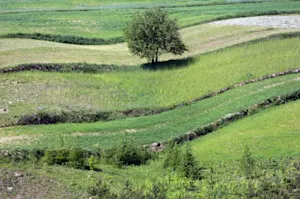What Makes This Word Tick
"Interstice" has a certain poetic charm, conjuring images of tiny gaps and narrow spaces. It's one of those words that sounds as delicate as what it describes. Picture the sliver of light peeking through a slightly ajar door – that's the magic of interstices in action.
If Interstice Were a Person…
Interstice would definitely be the quiet observer at a party, slipping between groups and catching snippets of conversation no one else hears. They’d have a knack for finding those small, unnoticed details and weaving them into fascinating stories.
How This Word Has Changed Over Time
"Interstice" has stayed relatively true to its roots over the centuries. Originally from the Latin "interstitium," meaning a space between, the word has maintained its focus on those tiny gaps that break continuity, whether in a physical sense or even in time, like the interstitial moments between major events.
Old Sayings and Proverbs That Use Interstice
Though not commonly featured in old proverbs, the spirit of "interstice" exists in phrases like "mind the gaps" or "between the cracks," reminding us to pay attention to the small but mighty spaces in life.
Surprising Facts About Interstice
A fascinating fact is that in anatomy, "interstice" is often used to describe the spaces between tissues. These nooks and crannies might seem insignificant, but they play crucial roles in the body’s functioning, just as the spaces in a wall might support the structure in hidden ways.
Out and About With This Word
You’ll find interstices in many places, from the architectural gaps in Gothic cathedrals to the spaces between musical notes that create rhythm. It's a word that invites you to notice the voids and the value they bring to form and function.
Pop Culture Moments Where Interstice Was Used
While not the star of pop culture, the concept of interstices often appears in the arts. Think of those suspenseful silences in a thriller movie that set the heart racing. That's an interstice doing its work!
The Word in Literature
Interstice is a favorite in literary circles, often used to evoke the delicate and the subtle. It would be right at home in the works of poets who delight in exploring the spaces between words as much as the words themselves.
Moments in History with Interstice
In history, the interstices between major events often define eras. Consider the years between world wars, filled with tension and anticipation. The periods "between times" are brimming with the potential for change and action.
This Word Around the World
Around the globe, interstices are recognized in various forms. In Japanese gardens, for example, the careful placement of rocks and plants to create spaces of calm and contemplation embodies the concept perfectly, serving as a pause in the luscious greenery.
Where Does It Come From?
The origins of "interstice" trace back to Latin, with "inter" meaning between and "stitium" relating to standing or stopping. Despite sounding a bit clinical, it invites us to appreciate those spaces that give structure to so much of what we see and do.
How People Misuse This Word
People often mistake interstices for more general gaps or holes, missing the slight nuance of it being a space amidst a larger body. It’s not just any gap, but one that defines and shapes its surroundings.
Words It’s Often Confused With
Interval: Often confused due to both describing spaces, but an interval is usually a time-based separation.
Chasm: A much larger gap implying a deep divide rather than a small space.
Gap: A broad term for any separation, whereas an interstice is more specific and subtle.
Additional Synonyms and Antonyms
Some synonyms for interstice include crevice, fissure, and crevasse, though each adds its own flavor to the concept. Antonyms like continuum or entirety contrast with interstice’s focus on separation.
Want to Try It Out in a Sentence?
Sure, give it a whirl: "She noticed the interstices in the old stone wall where the moss had quietly grown, softening the harsh lines with their green."
















